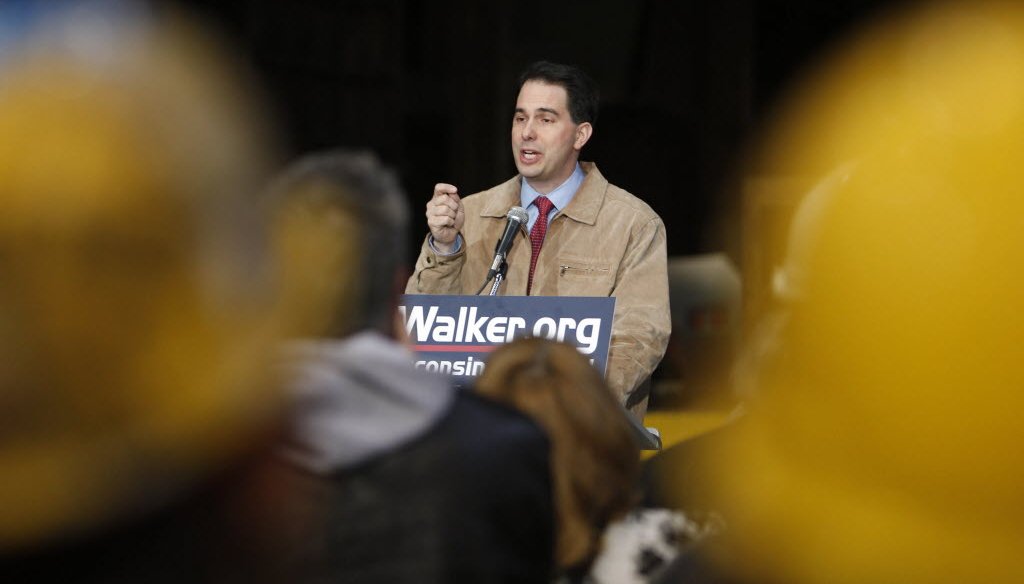Stand up for the facts!
Our only agenda is to publish the truth so you can be an informed participant in democracy.
We need your help.
I would like to contribute

First-term Gov. Scott Walker is facing a recall election this summer. He is shown here launching his campaign.
The pace of claims and counter-claims is accelerating as Wisconsin’s recall election for governor sprints to its June 5, 2012 conclusion. The primary is May 8.
We’ve been tracking many of the statements, and will continue to do so in the coming weeks.
Here’s a look at the some of the major emerging issues in the campaign ads, with a foundation of past Truth-O-Meter and Walk-O-Meter ratings to help you sort out fact from fiction.
Education
This has become the most contentious of all issues in the wake of Republican Gov. Scott Walker’s moves to cut state aid for local schools, and toughen limits how much districts could raise in property taxes. Walker and Republicans also gave schools the ability to cut their employee costs by eliminating most collective bargaining with unions, and many schools responded by getting workers to pay more for health insurance. Walker’s own budget forced school employees, local government workers and state employees to pay more towards their own pensions.
The PolitiFact Wisconsin vault is overflowing with dozens of rulings on education claims related to the budget battle.
A sampling:
We found that about 75 percent of school districts reported a net loss of staff, but found that a Wisconsin Education Association Council claim that nearly 4,000 educators were laid off due to budget cuts was False.
Walker made the biggest cut to state aid in state history -- True, we found. But we rated False a claim they were the biggest in the United States, based on a limited study at the time, in October 2011.
Of course, the state aid cuts are only one side of the equation in evaluating how schools’ budgets fared under the GOP plan. The other side is how much they were able to use Walker’s collective bargaining limits to cut their costs.
Taxes
We found that in his budget, Walker broke a promise to oppose "any and all" tax increases because he supported a scale-back of tax credits for low-income people. However, as we noted, the overall effect of all of Walker’s tax changes was to a net reduction.
Meanwhile, we found that Democratic gubernatorial hopeful Tom Barrett raised property taxes in seven of eight city budgets as Milwaukee mayor, but did not break a promise to freeze them.
We rated True a claim that another Democrat running for governor, Kathleen Falk, had raised property taxes every year but noted that Dane County’s increase was 16th lowest among the 72 counties.
State budget deficit
You will hear repeatedly from Walker that he wiped out a $3.6 billion budget deficit. We rated that True, while noting he has a constitutional obligation to do so when presenting a budget.
Women’s issues
Democrats and labor leaders are giving this a high profile, mirroring the left’s "War on Women" attacks against Republican presidential candidate Mitt Romney.
In particular, expect to hear a lot about two pieces of legislation enacted by Walker and GOP lawmakers.
One bill eliminated the ability of workers to sue employers in state court for compensatory and punitive damages in cases of alleged discrimination based on gender, age and race. Democrats had granted this right to sue in a 2009 law approved when they controlled state government.
With some backing from legal experts, Democrats argue narrowing workers’ legal options could harm enforcement of pay equity among men and women working the same job.
Falk went further, claiming women facing pay discrimination "can’t do something about" because of the GOP legislation. We rated that False, noting that women still could sue in federal court and take their grievances to state agencies. We took a broader look at the bill here.
An abortion-related bill signed by Walker in early April 2012 requires doctors to consult with patients face-to-face -- rather than via Web camera -- when discussing administering abortion-inducing drugs. That measure also required doctors to speak privately with women seeking abortions to ensure they were not being coerced, and physicians could face felonies for ignoring the law.
In the 2010 governor’s race, we delved into Walker’s positions on abortion repeatedly, including a charge made by Barrett that Walker "wants to ban common forms of birth control, including the pill." We rated that Half True.
Jobs, Jobs, Jobs
Brace yourself for an onslaught of seemingly contradictory numbers in TV ads and elsewhere. Pay attention to the time frame the ads’ are talking about. It matters, because the state lost jobs in the private sector in 2011 but recorded gains in early 2012.
And check if the claims is about employment or unemployment -- the trends can go in opposite directions because they are measured in different ways.
For a month-by-month account of job creation and loss, see the detailed graphics and stories that accompany our Walk-O-Meter, which tracks Walker’s promise to create 250,000 new jobs by the end of his term. Also see our archive of jobs-related rulings on the Truth-O-Meter.
We also took a look at the topsy-turvy trends in a recent article.
Meanwhile, both Falk and Barrett are under attack for the rise in unemployment in their municipalities. Falk is the former Dane County executive; Barrett is currently mayor of Milwaukee.
Strictly on the numbers, we confirmed claims that Dane County "added more jobs" than any other Wisconsin county, that Dane County unemployment tripled during Falk’s tenure, and that during Barrett’s mayoralty unemployment rose 27%, one of the biggest increases among major cities.
But we knocked all those claims down to Half True because the speakers either put too much blame on the local official, or the official claimed too much credit.
Collective bargaining
This issue is playing a big role in the Democratic primary, due to differences between Barrett and Falk, the two favorites. But it also comes up in attacks that Walker misled voters in the 2010 governor’s race about his dramatic plans to nearly end collective bargaining.
Regarding Barrett, we found he consistently opposed Walker’s bargaining limits but also favored the health and pension concessions from workers.
In early 2011, we found False Walker’s claim that he campaigned on the union proposals in his budget repair bill, noting he offered only specific, limited reforms to the existing system.
Our Sources
See Truth-O-Meter and Walk-O-Meter items





















































